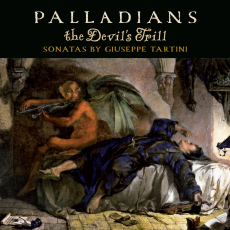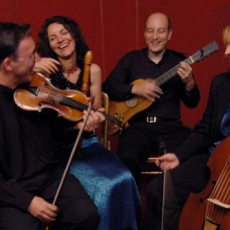Giuseppe Tartini - Palladians - MusicWeb International
On the day that there arrived a packet of CDs for review, a packet containing the present disc, I was reading my way through the often tedious pages of a volume published in London in 1778 (The Fashionable Tell-Tale) trying to find an anecdote about Milton which it was supposed to contain. I got distracted by a familiar story about Tartini, which I had just finished reading when the post arrived. I opened up the packet and found this disc staring me in the face. The coincidence is too neat - some might say disturbing! - for me to ignore it. This is what I had just been reading:
"Tartini, a celebrated musician, who was born at Pirano in Istria, being much inclined to the study of music in his early youth, dreamed one night that he had made a compact with the devil, who promised to be at his service on all occasions ... during this vision ... at last he imagined, that he presented the devil with his violin, in order to discover what kind of musician he was; when, to his great astonishment, he heard him play a solo so singularly beautiful, and which he executed with such superior taste and precision, that it surpassed all the music which he had ever heard or conceived in his life. So great was his surprise, and so exquisite was his delight, upon this occasion, that it deprived him of the power of breathing. He awoke with the violence of his sensation, and instantly seized his fiddle in hopes of expressing what he had just heard; but in vain: he, however, then composed a piece, which is, perhaps, the best of all his works: he called it ‘The Devil's Sonata', but it was so far inferior to what his sleep had produced, that he declared he would have broken his instrument, and abandoned music for ever, if he could have found any other means of subsistence".
A student of comparative mythology might discuss the analogy with the legend of Faust; a cultural historian would see in the story a resemblance to such Romantic fictions as Coleridge's account of the creation of ‘Kubla Khan'; a cynic might suggest that Tartini would, in later times, have made a good career in advertising or self-promotion. All three would agree, surely, that the story is a good one. And is the music good? Yes, and it is illuminated - or perhaps one might say more aptly, darkened - by knowledge of the story.
The fascinating music of the sonata has a kind of introversive galant quality in this interesting performance, a reading which resists any possible temptation to mere showiness. Tartini was, by all accounts, a famously quiet and secretive man, and such a flavour is imparted to this performance, simultaneously brooding and ominous, graceful and refined. Here, as has not always been the case with performances of this piece, the listener's interest is primarily psychological and emotional, not technical. There is an intensity here - and elsewhere on the disc - which packs a considerable punch without ever being overstated. Indeed, this ‘trillo del Diavolo' does sound like the reluctantly expressed and troubled feelings of an essentially reclusive man. Rodolfo Richter, playing a 1674 Guarneri, plays at the tipping point between self-communion and performance for others, and the continuo accompaniment is beautifully judged, economic and supportive. The opening larghetto is a particular delight, full of darkling elegance. The third movement (marked ‘Sogni del autore: Andante - Allegro assai - Il trillo del Diavolo') relates most specifically to the famous anecdote and again both soloist and ensemble work are of the highest order, subtle, powerfully expressive in a kind of tight-lipped fashion. In the booklet notes, William Carter makes the claim that in the case of Tartini's works the "virtuosity rises out of a desire to express rather than amaze" and writes of Tartini's music having an "intense pictorial inward gaze". That puts it very well - and the performances justify the nature of the claim.
The story of Dido has inspired many fine musical works - from the pens of Purcell, Berlioz, Cavalli, Clementi, Hasse and many others - and Tartini's marvellous ‘Didone abbandonata' deserves a place of honour in the roll call of such compositions. It can perhaps be thought of as an instrumental version of the baroque solo vocal lament, in a line of descent, that is, from pieces such as Monteverdi's ‘Lamento d'Arianna', Cavalli's ‘Lamento di Cassandra' from his opera La Didone, Luigi Rossi's ‘Lamento di Zaida mora' or Carissimi's ‘Lamento della Regina'. The English listener will surely think of Purcell and the most famous aria from Dido and Aeneas. The three movements of Tartini's ‘Didone abbandonata', although they don't have the benefit of verbal text, are on an expressive par with any of these vocal laments. It covers the gamut of relevant emotions, beginning with the complexities of memory, hope and fear in the opening ‘affetuoso', the angry recognition of the truth of her abandonment in the central ‘presto' and the terrible bleakness of the closing ‘allegro'. This is masterpiece which ought to be better known and this is a splendid performance which puts a wonderfully persuasive case for the piece.
The other works by Tartini included here are perhaps not quite so special as these two, but they are eminently worth hearing ... and rehearing. Tartini is a searching and rewardingly complex composer whose music - as opposed to just his legend - deserves to be more widely familiar.
The Palladians - a new incarnation of the group we previously knew as the Palladian Ensemble - add to this selection of works by Tartini one of the sonatas of Francesco Maria Veracini. This is no mere ‘filler', its presence serving a real purpose. Veracini made a considerable impact on the young Tartini when he first heard him play in the 1610s. Another part of the Tartini story - the ‘biography' we have of Tartini often sounds as much like myth as history - has it that Tartini abandoned his wife so as to devote himself to improve his own technique on the instrument. The admiration was chiefly, one suspects, for Veracini's instrumental ability, rather than for the music he wrote. To listen to ‘Il trillo del Diavolo' and ‘Didone abbandonata' alongside this sonata by Veracini is to realise to what different purposes virtuosity can be out. For all that Veracini was a notoriously unstable man, his music rarely plumbs the kind of psychological and expressive depths that are charted by Tartini. There is a greater polish, a shinier finish to much of Veracini's work; one is dazzled more than one is moved. Of course, there are moods in which brilliance is just what one wants - and Veracini certainly provides that. There is more than just brilliance, of course, but not, generally speaking as much real emotional substance as there is in Tartini's work.
There are, of course, other excellent interpretations of these pieces - such as Andrew Manze's Tartini (on Harmonia Mundi), The Locatelli Trio's Tartini (on Hyperion) and John Holloway's Veracini (on ECM). But the Palladians stand up pretty well to any of these comparisons. If you have no recordings of ‘Il trillo del Diavolo' and ‘Didone abbandonata' these are amongst the most attractive candidates for purchase. They can also be warmly recommended to those who want to hear more than one intelligent and sensitive performance of this fascinating music. The recorded sound is as good as one now expects from Linn.

